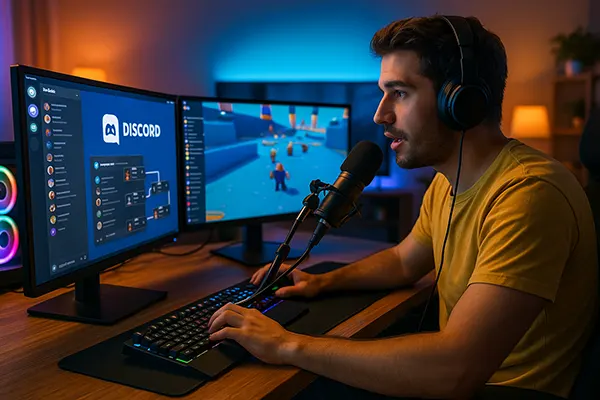
Earning from Hosting Online Tournaments on Discord
Organising online tournaments through Discord has become a practical and creative way to make money from home in 2025. Whether you’re targeting gamers, hobby communities, or educational groups, Discord offers all the necessary tools to run interactive, scalable events. By applying structure, clear rules, and effective promotion, it is possible to build a sustainable income stream through tournament management, even without technical experience.
Understanding the Potential of Discord Tournaments
Discord is no longer just a communication tool for gamers — it’s a hub for communities of all kinds. The platform supports advanced features like voice channels, screen sharing, bots, and role management. These tools allow organisers to run fair and engaging competitions across different niches, including video games, trivia, and creative challenges.
In 2025, many communities use Discord to maintain regular engagement, and tournaments have proven to be one of the most popular activities. With low overhead costs and a global audience, there is increasing demand for well-managed competitions. By identifying what your community values — skill, entertainment, or educational value — you can tailor events that people are willing to pay to enter or sponsor.
Beyond entertainment, Discord tournaments also serve professional and educational purposes. Language-learning competitions, tech hackathons, or productivity sprints can all be monetised. This makes Discord tournament hosting appealing not just to gamers but to freelance educators, consultants, and hobbyist community leaders.
Choosing Your Niche and Monetisation Strategy
Before launching, define your target audience and the type of tournament you’ll host. Popular gaming titles like Valorant, Fortnite, or Minecraft attract large audiences, but also face high competition. Niche games or themed trivia contests may attract smaller but more loyal participants, which can be easier to manage and monetise.
Revenue models vary: you might charge entry fees, offer premium subscriptions for VIP access, or attract sponsors who want visibility in a targeted community. Some organisers also generate income through Twitch or YouTube livestreams of their events, using affiliate marketing and ad revenue to supplement their earnings.
Prize pools, even if modest, add motivation and credibility to your event. You can offer digital rewards, such as game keys or credits, or even partner with creators to provide exclusive content. Transparency and fairness in distributing rewards will build your reputation and grow your audience organically over time.
Building and Managing Your Discord Server
Effective organisation begins with a well-structured Discord server. This means using category folders, clear channel names, and pinned messages to guide participants. Setup should include dedicated areas for announcements, registration, rules, match reporting, and technical support.
Bots play a vital role in automation. For example, tournament bots like TourneyBot, MEE6, or Hostbot can manage brackets, record match results, and send reminders. These tools reduce manual workload and ensure consistency. Integrating Google Sheets for scoring or creating Notion dashboards can further improve administration.
Role assignment is also key to managing large events. Assign roles such as “Player,” “Moderator,” or “Spectator” to limit access and streamline communication. This creates a professional environment and makes it easier for participants to follow the structure of the tournament.
Ensuring Smooth Communication and Fair Play
Communication is critical before, during, and after the tournament. Use scheduled announcements and reminders to reduce no-shows. Clearly outline the rules in advance and pin them in a dedicated channel. Respond promptly to questions and disputes to maintain trust and keep the event on track.
Enforce fair play through clearly written rules and the use of moderators or referees. Use screen sharing or replay review in competitive games to verify results. For skill-based games, consider randomising brackets or seeding based on skill levels to avoid unfair matchups.
Feedback forms after each tournament are invaluable. They help you refine future events, detect issues early, and increase participant satisfaction. Over time, this feedback loop will improve your service quality and participant retention.

Marketing Your Tournaments and Growing a Brand
Promotion is crucial for success. Use social media platforms like Twitter, TikTok, and Reddit to reach potential participants. Posting in relevant Discord communities with permission can also drive traffic. Eye-catching visuals, short trailers, and testimonials from past participants boost credibility and reach.
Create a content pipeline by streaming or recording your events. Publish highlight reels, interviews, and behind-the-scenes clips on YouTube or Instagram. These assets not only serve promotional purposes but can become additional revenue streams through monetisation and affiliate links.
Consider building a newsletter or Discord notification group for recurring events. Loyal participants are more likely to return if they are reminded and feel valued. Offer referral incentives or early bird perks to encourage sign-ups and reward your core community.
Legal Considerations and Long-Term Planning
In 2025, earning money through digital events requires legal awareness. If you charge entry fees or distribute cash prizes, check your local regulations regarding licensing, tax reporting, and age restrictions. Some jurisdictions may classify such activities under gambling or e-sports, requiring registration.
Use terms and conditions to protect yourself and clearly communicate your policies on refunds, disqualifications, and prize delivery. Always operate transparently and keep records of transactions and communications to prevent disputes.
For long-term sustainability, treat your tournament hosting as a business. Develop a recognisable brand, use feedback for continuous improvement, and explore partnerships. You can eventually scale by training others, offering consulting, or launching your own tournament organisation service.
